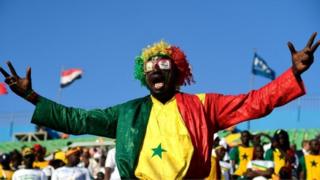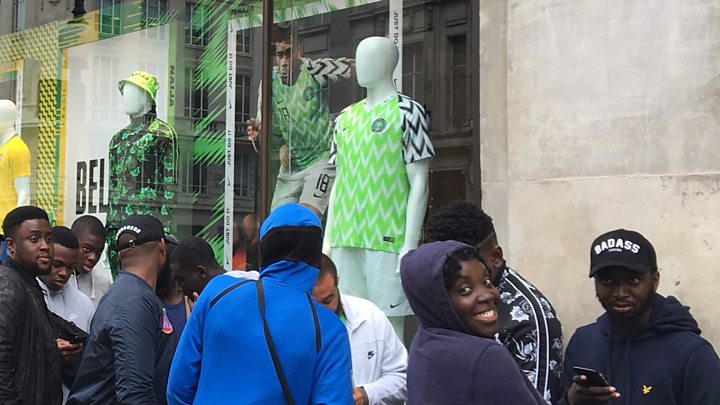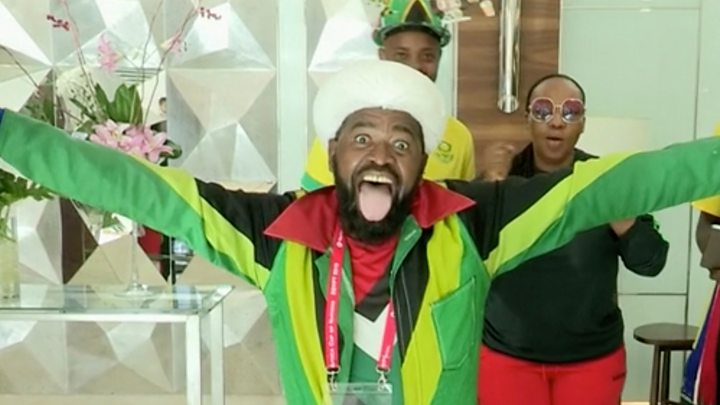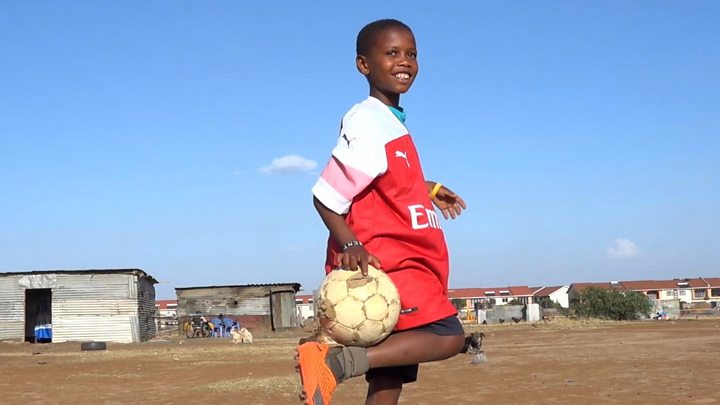Africa’s ‘fairy-tale’ team, cursed jerseys and super fans
As Algeria and Senegal face each other in the Africa Cup of Nations (Afcon) final in Egypt on Friday, we look at some of the high and low points of the continent’s biggest football tournament.
The knights of Madagascar
We all love an underdog and low-ranking Madagascar were the team many neutral fans were rooting for.
The Barea – named after a local hump-backed zebu cow – went on a fairy-tale run, outplaying and beating mighty Nigeria before reaching the quarter-finals in their first Afcon appearance.
Five years ago, Madagascar were ranked 190 out of 211 in the Fifa world rankings.
To qualify for the finals in Egypt, they had to take part in the preliminary round of qualifying, against Sao Tome and Principe in early 2017.
The country does not have a professional league and most of the squad play in the French second division, while others are based in Bulgaria, Saudi Arabia, the United States, Algeria and Egypt.
So impressed was President Andry Rajoelina with the team’s performance when they made it to the last 16 that he paid for a plane carrying 480 fans from Madagascar to watch their game against the Democratic Republic of Congo, which they won.
Their impressive run of victories came to an end against Tunisia, but it didn’t lessen their achievement.
President Rajoelina who gave the players the rank of Knight of the Malagasy National Order, one of the highest state commendations, when they returned home. And their current ranking of 108 is set to rocket.
Fans of Desert Foxes cause French mayhem
If there’s some added European interest in the tournament, then the Algeria fans have a lot to do with it.
The massive diaspora community in France has been gathering in cities across the country to cheer on their team, but their celebrations have sometimes been over the top.
On Monday, French police arrested 282 Algeria fans in three cities, including the capital, Paris, after violent celebrations broke out when Riyad Mahrez scored a late winner against Nigeria to secure the Desert Foxes a spot in the final.
Last week, 43 Algerian fans were arrested on the Champs-Elysees in the French capital after the team won their semi-final match against Ivory Coast.
AFP news agency reported that two nearby stores were looted. It also quoted a security official as saying that in the southern city of Montpellier a celebrating fan lost control of his car and ran over a family, killing a woman and seriously injuring her one-year-old baby.
French Interior Minister Christophe Castaner described the actions of the fans as “unacceptable”.
Many are no doubt nervously waiting to see how things will pan out in France in the final match against Senegal’s Lions of Teranga.
However, by reaching the Afcon final, the Algerian football team has brought some distraction to the ongoing political turmoil in the country.
People have been protesting every Friday for months, demanding a complete overhaul of the political system after forcing long-time leader Abdelaziz Bouteflika to step down.
More from Algeria:
Why did Nigeria lose?
According to some Nigerian fans, the colour of the jersey the Super Eagles players wore, and not Riyad Mahrez’s stunning last-minute free-kick, was the real reason the team lost to Algeria.
The team was wearing the “jinxed” dark green kit, they said.
It was their second loss at the tournament with the “cursed” jersey – the other was against none other than Madagascar.
Suspicion the jersey brought bad luck to the Super Eagles started at the 2018 World Cup when the team lost to Croatia and later to Argentina in a crucial match in which they needed just a point to progress to the knockout stages.
The pernicious influence of the shade of green has not confined itself to men’s football. The Super Falcons were wearing the same jersey colour when they recently lost to Germany at the Women’s World Cup in France.
However, inasmuch as fans may be quick to lay blame on the outfit, there have also been times when Nigeria won football matches donning the dark green jersey.
Maybe they just want the team to always wear the home kit, with its zigzag design that wowed fans and fashionistas alike ahead of last year’s World Cup.
The army and the Pharaohs
The inquiry into how the home team, one of the tournament’s favourites, was knocked out early is still ongoing.
Egypt’s loss led to an immediate purge of officials, including the coach, amid calls for an overhaul of how the game is run in the country.
Farouk Gaafar, who coached the Pharaohs in the 1990s, even suggested that the army should take over the administrative roles, saying there was a need for “discipline that will be found only in the army”.
He said football management needed someone with “an iron fist”.
“I haven’t seen discipline like in the armed forces,” said Gaafar, who once coached an Egyptian club run by the military.
The prospect of the army being in charge of running football is unlikely to appeal to many players.
Unlike Egypt, for Tanzania, Namibia, Guinea and Cameroon there is no talk of a military takeover, but they have all sacked their coaches because of their bad performance, while Uganda’s French coach Sebastien Desabre left by mutual consent.
Harassment allegations
Egyptian midfielder Amr Warda was dropped for disciplinary reasons after social media conversations allegedly between him and a number of women were released following Egypt’s game against Zimbabwe. There were allegations of sexual harassment.
He apologised to family, friends and team-mates in a social media video.
The allegations first emerged when Egyptian model Merhan Keller posted pictures on Instagram of inappropriate messages she says she received from Warda.
Other social media users also shared pictures of conversations and videos purporting to show Warda harassing them or other women online.
Shortly after Egypt beat the Democratic Republic of Congo to reach the final 16, Salah tweeted: “‘No’ means ‘no’.”
But added: “Many who make mistakes can change for the better and shouldn’t be sent straight to the guillotine.”
In a second tweet, Salah commented: “We need to believe in second chances… we need to guide and educate. Shunning is not the answer.”
Women must be treated with the utmost respect. “No” means “no”. Those things are and must remain sacred. I also believe that many who make mistakes can change for the better and shouldn’t be sent straight to the guillotine, which is the easiest way out.
End of Twitter post by @MoSalah
The tweets, which both received almost 5,000 comments, were met with angry reactions online.
“[Your] courage is in the wrong place [to defend] a harasser and a dirty man,” replied prominent Egyptian journalist Islam Akel.
Warda’s ban lasted two games but his return could not save Egypt.
The super fans
A Zimbabwean and a South African wanted to make history as the first people to make it from Cape to Cairo by road for a sports tournament.
Botha Msila and Alvin Zhakata aimed to conquer 10,000km (6,200 miles) by hitching rides and taking buses, but they ran into trouble at the Kenya-Ethiopia border as Ethiopia wanted them to apply online for a visa – this caused delays because of an internet blackout in the country.
Msila opted to fly to Cairo after South African officials and a media group intervened to help him.
Zhakata stuck to his plan. He eventually secured a visa to enter Ethiopia, and then ventured further north to Sudan, which was in the midst of a revolution.
He had been updating his followers on Twitter about his trip so when he did not post anything for days, the #FindAluvha campaigned was launched.
After Zhakata re-emerged, he said an internet shutdown in Ethiopia and Sudan had prevented him from updating his social media accounts.
His 44-day journey to Egypt began on 27 May, taking him through Zambia, Tanzania, Kenya, Ethiopia and Sudan.
He told the BBC his life had been “threatened” several times but he was proud to have made it and felt “he was on top of the world”.
#IchavaNhoroondo:HISTORY MADE
The 1st and ONLY human being to COMPLETE a journey by ROAD from #CapeToCairo fo a sporting tourney is a proud Zimbabwean named ALVIN ZHAKATA
RT if u wer alive wen this happened. @robertmarawa @Chakariboy @edmnangagwa @ChickenInnZW @zororophumulani pic.twitter.com/eLnVYaSZJM
End of Twitter post by @AlvinZhakata
His inspiring story has also brought him good tidings – the president of the Confederation of African Football (Caf), Ahmad, has said that Zhakata will get a VVIP ticket for the final match. He will also pay for Zhakata’s flight back to Zimbabwe.
Zhakata, who calls himself “a prisoner of passion and an adventurer”, advises that “if you have a dream go for it”.
The Ozil boy
A few months ago, 12-year-old Lawrence Masira was just a normal Kenyan boy playing football in the dirt in the capital, Nairobi.
A passerby snapped a picture of him wearing an Arsenal jersey with the name of star midfielder Mesut Ozil drawn on the back of the shirt his mother had bought him.
A picture of Lawrence’s makeshift shirt was posted online and eventually came to the attention of the Arsenal star who sent him a signed shirt and football boots.
And things continue to get better for Lawrence – he was picked as a mascot at the Afcon quarter-final between Tunisia and Madagascar.
A dream came true for Lawrence Masira on Thursday. One of the escort kids during the Tunisia game at the ongoing #AFCON2019. Amazing stuff. Thanks @MesutOzil1088 pic.twitter.com/19OwvrLrXW
End of Twitter post by @EricNjiiru
Big country v small country
Tanzania were knocked out of the group stages with zero points.
It was an embarrassing performance that drew the ire of President John Magufuli, who found the Taifa Stars’ loss against Senegal to be especially indefensible.
“How can Tanzania with 55 million people lose to a country of two million people? We have to ask how we cannot get 11 players from our population to represent us in this important game which is loved all over the world,” the bemused president said.
He had a point that Tanzania was more populous than Senegal, but he undercounted the West African nation’s population by 13 million.
Though the loss was not unexpected as in Fifa’s ranking Senegal are Africa’s top team while Tanzania are placed 36th.
Ghana’s ‘general captain’
The debate about who should captain Ghana’s Black Stars has been contentious for many years.
When Asamoah Gyan – who had led the team for seven years – found out that he was going to be replaced as captain this time round by Andre Ayew, he immediately announced his retirement.
However, he rescinded his decision after a telephone conversation with Ghana’s President Nana Akuffo-Addo and being named the “general captain”.
No-one had a clue what this military title meant but it managed to assuage Gyan.
Yet the “general” failed to lead the Black Stars to their first Africa Cup of Nations’ trophy since 1982.
Empty stadiums
Apart from matches featuring the hosts, other games have been poorly attended.
The organisers admit that the cost of the ticket and a system that required fans to obtain a special identity card locked out many supporters.
Mohamed Fadl, the chief executive of the Local Organising Committee, said this would change for the final game, which will be “full to capacity”.
Some reports say Algerian authorities have made available 28 commercial planes and six military ones to transport 5,600 fans to watch the match.
So the stadium should be as packed, noisy and colourful as it was during the first game between Egypt and Zimbabwe; a befitting send-off to a cracking football festival.
Source: Read Full Article






